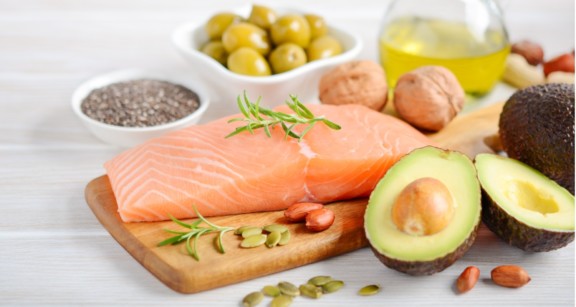Intermittent Fasting
What is intermittent fasting? Is intermittent fasting healthy? Is intermittent fasting only for weight loss? Although you may have heard of intermittent fasting or IF for short, you probably have a lot of questions.
For the uninitiated, intermittent fasting can even seem scary. It involves restricting your eating. How can you possibly get through your day without eating?
No need to worry. In fact, you’ve probably already gone through intermittent fasting without even noticing. Maybe you slept in late over the weekend or you got caught up in a hobby and forgot to eat. Intermittent fasting is about being more conscious of scheduling in this non-eating time. That’s it.
Explore everything you need to know about how to get started with intermittent fasting and if it’s right for you. We’ll go through an overview of intermittent fasting benefits and how you can incorporate it into your lifestyle if it aligns with your health journey.
What is Intermittent Fasting?
Although intermittent fasting has gained momentum in the health and wellness space recently, it is not a new concept. Intermittent fasting has been practiced all over the world for centuries. From a religious standpoint, Christians have a tradition of fasting during Lent, leading up to Easter. In Islam, fasting during the holy month of Ramadan involves abstaining from food and drink during daylight hours.
Today, there’s a growing interest in finding sustainable ways to improve health and wellbeing. As we’ll see, research into intermittent fasting has suggested potential benefits like memory support, healthy weight maintenance, improved insulin sensitivity and even increased longevity.1 And one of the great things about IF is that it doesn’t restrict what you eat—just when you eat it, so it’s easy to implement. Let’s dive in.
Intermittent Fasting Benefits
You’ve probably heard of intermittent fasting for weight loss. When you fast, your body eventually uses up your last meal’s calories and starts burning fat.2 But the benefits of intermittent fasting go much further. Letting your digestive system rest longer between meals can positively affect many other aspects of your body and even your mind. Here are some exciting intermittent fasting benefits:
Lowers Blood Pressure
Intermittent fasting can help bring down your blood pressure, regardless of whether you are losing weight through fasting.3 This benefit is great for people who want to maintain their weight but are looking for ways to help with high blood pressure.
Decreased Stress
When your body goes into a fasting state and switches to ketone-based energy (read all about ketosis here), it can have a higher tolerance for stress.4 Although stress resistance will vary from person to person, it is an interesting and unexpected benefit of intermittent fasting.
Promotes Longevity
Intermittent fasting helps slow down the aging of cells, which in turn improves longevity.5 Fasting promotes autophagy, which is when your body removes damaged cells and recycles them for energy. It stimulates autophagy, which slows down the aging process.
Reduces Inflammation
Intermittent fasting is associated with lower levels of inflammation.6 This benefit can affect many aspects of your well-being. Chronic inflammation is linked to various stress-related conditions, so reducing inflammation through fasting might have indirect stress-reducing effects.
The research into intermittent fasting benefits is still ongoing, but the results we’ve seen so far are promising. If you choose to try IF, remember to listen to your body and adapt your fasting schedule according to your needs. To help keep track, consider keeping a journal to see what works for you. Always be sure to consult with your healthcare provider before attempting intermittent fasting.
How to Intermittent Fast
There are many intermittent fasting schedule possibilities. Whichever approach you choose, it’s a good idea to start slowly. Listen to your body and adapt accordingly. When you are fasting, you should hydrate with non-caloric drinks like water, tea or coffee (without additives like sugar or cream). The best intermittent fasting schedule is the one that fits with your lifestyle. Here are some common intermittent fasting schedules to consider:
16:8 aka Leangains
The 16:8 method is popular because it is easy to try. It involves fasting for 16 hours and then eating all your calories within an 8-hour window. For example, if you start your eating window at 12:00 PM (noon), you will finish eating by 8:00 PM. This means that your fasting period would be from 8:00 PM until 12:00 PM the next day, resulting in a 16-hour fasting window.
12-hour fast
The 12-hour fast can be a great place to start for beginners because it is easy to achieve. Just cutting out snacks after dinner could help get you on this schedule. For example, if you finish dinner at 7:00 PM, you can start eating again 12 hours later, which would be 7:00 AM.
Eat-Stop-Eat
The Eat-Stop-Eat schedule was popularized by the author Brad Pilon, with his book of the same name. It involves fasting for one or two 24-hour fasting periods in a week (consecutive or not), followed by days of normal eating.
Alternate Day IF or 5:2
Alternate Day Fasting is exactly as it sounds: you alternate between fasting days and eating days. On fasting days, you either consume no calories or very few (around 500). On eating days, you eat normally.
The 5:2 diet involves eating normally for five days of the week and restricting calorie intake on the other two non-consecutive days. During the two fasting days, your calorie intake should be around 500 to 600 calories.
20:4 or Warrior Diet
In this schedule, you fast for 20 hours and then have a 4-hour window to eat. The Warrior Diet is named after the idea that ancient warriors might have followed a similar eating pattern. They probably consumed a large meal at night after a day of hunting and other activities.
23:1 or OMAD
The 23:1 fasting method, often referred to as OMAD (One Meal A Day), involves fasting for 23 hours and consuming all your daily calories within a 1-hour eating window. It is one of the most restrictive forms of intermittent fasting.
What Breaks a Fast?
Breaking a fast in a mindful and balanced way can provide your body with the nutrients it needs while avoiding potential discomfort. You can start by making sure you are properly hydrated. Then, eat a small snack or meal to allow your digestive system to adjust. Choose high-quality, nutrient-dense foods like quality proteins, healthy fats and vegetables. Avoid processed foods and try not to overeat. Remember to listen to your body and adjust your routine accordingly.
What can you eat or drink while fasting?
During your fast, avoid eating any food to help your body experience the metabolic effects of fasting (ketosis) quicker. But don’t forget to stay hydrated with non-caloric drinks during your fast. You can choose from herbal tea, green tea, black coffee (without sugar) or sparkling water for example.
What is the best way to break a fast?
When you’re fasting, your body enters a fat-burning state called ketosis. If your health goals include weight loss, keeping your body in this state will help your body continue burning calories. Choosing nutrient-dense keto foods (high fat and low carb) is a great way to break your fast. Or, one of our favorite ways to break a fast is with a rich and creamy Bulletproof coffee.
Remember to go slowly and choose foods that are easy to digest. Re-introduce food gradually and see how your body responds. Eating high-fat foods like nuts or avocados can help you feel fuller sooner and prevent overeating as you get back to your regular schedule. Make a detailed intermittent fasting plan so you’re ready to prepare our meals before it’s time to eat.
Intermittent Fasting Recipes
Boost your chances of success with intermittent fasting. Discover meal options that align with your preferences and daily routine. Plan your eating schedule in advance to adhere to your fasting regimen and experiencing its advantages.

Break Your Intermittent Fast With These 19 OMAD Recipes

The Ultimate Bulletproof Coffee Roundup

24 High-Protein Breakfast Recipes to Power Your Day

Break Your Fast With Quality Fats: Fuel Up With These 20 Recipes

Bulletproof Breakfast: Buddha Bowl

Keto Coffee Recipes to Keep You Happy and Laser-Focused
The Science-Backed Benefits of Intermittent Fasting
Although the research in this field is ongoing, there are many animal and human studies that show promising results using various intermittent fasting schedules.
Intermittent fasting may help manage insulin levels and body weight for insulin-treated people with type 2 diabetes, according to a 2023 study.7 Researchers determined that three non-consecutive days of fasting per week for 12 weeks significantly reduced participants’ blood glucose levels. This is an exciting breakthrough that can potentially help complement diabetes treatment.
Another recent research study points to a surprising result: intermittent fasting can help regulate the desire to eat.8 The study compared a heart-healthy caloric restriction diet with intermittent fasting. Even though both diets had similar calories, IF proved to reduce people’s hunger levels. This result is especially interesting for people who are looking to reduce extra calories from mindless snacking.
And finally, adopting a 16:8 fasting schedule (16 hours of fasting and 8 hours for eating) could improve quality of life and decrease fatigue.9 The study followed 30 healthy people over a three-month period. Body and mental fatigue decreased significantly during this time. Plus, the study demonstrated that the 16:8 fasting plan is compatible with shift workers and active laborers.
Who should avoid intermittent fasting?
Intermittent fasting is not for everybody. Pregnant or breastfeeding women, children and adolescents or underweight people should not attempt intermittent fasting. If you have an eating disorder, feel stressed about fasting, are elderly or a very active athlete, you should refrain from fasting.
Before considering starting an intermittent fasting schedule, consult with a healthcare professional. What works for one person might not work for another and you should consider your individual health conditions, needs and goals when making dietary decisions.
Learn More About Intermittent Fasting
Intermittent Fasting Articles
How to Boost Your Intermittent Fasting Results
Does Intermittent Fasting Help With Your Weight? What You Should Know
The Complete Intermittent Fasting Guide for Beginners
Intermittent Fasting for Women: What You Need to Know
The Incredible Benefits of Intermittent Fasting
Ready to Try Intermittent Fasting? Everything You Need to Get Started
Intermittent Fasting Roadmap Download
The Key to Intermittent Fasting for Women: IFPC
Intermittent Fasting Roadmap Download
Does Bulletproof Coffee Break Your Intermittent Fast?
Longer Fasting on Keto for Self-Growth
Types of Fasting Diets and How to Choose the Right One
Can You Take Supplements While Fasting? What You Need to Know
The Bulletproof Approach to Intermittent Fasting
At Bulletproof, we recommend eating nutrient-dense food and products that fuel your everyday. Intermittent fasting can be a great addition to your health journey, by outlining when you should eat. By combining a Bulletproof keto diet with IF, you can enjoy even more health benefits. Browse our variety of products to complement your intermittent fasting plan and ways to boost your intermittent fasting results.
How BP products can support different approaches to intermittent fasting
We offer a variety of products that are appropriate to consume during your intermittent fasting schedule. We pride ourselves on clean, lab-tested ingredients to ensure you’re getting the most out of our products. We also have a guide for intermittent fasting you can download for free.
During your fast, black coffee, without sugar, can be a convenient and delicious way to boost your energy. And it can even help manage your appetite, amongst other benefits.10
If you’re following the OMAD schedule, you have to get all your days’ worth of nutrients in a single meal. Check out our 19 OMAD recipes you can incorporate in your routine to explore complete meals that are meant for this schedule.
Regardless of the IF regimen you choose, it’s best to break your fast with high-quality, nutrient-dense foods or drinks. Try adding Brain Octane C8 MCT Oil to your salad dressing for a good dose of healthy fats. Or mix Collagelatin into your soup, smoothie or drink as a thickening agent.
FAQs
Start with an intermittent fasting schedule that fits your lifestyle. For example, the 12-hour fast is relatively easy to achieve. By simply cutting out snacks after dinner and having a late breakfast, it’s likely that you can go 12 hours without food. As you become more comfortable, consider experimenting with longer fasting periods. The best intermittent fasting schedule is one that works for you.
Yes, but moderation is key. Exercising during fasting periods is generally safe (and can help keep your mind off eating) but stay well hydrated and don’t overdo it11. Plus, make sure to eat enough calories to meet your needs during your eating window. If you’re unsure, speak to a healthcare provider for advice.
Yes. IF doesn’t restrict the type of food you eat, only when you eat it. That means that IF is compatible with most diets.
As you begin IF, you may initially feel mild hunger. But the good news is that your body is likely to adjust over time, so that you feel less hungry during your fasting window. Ease into your IF schedule slowly so your body can get used to the new regimen.
Yes. It’s fine to continue IF long-term if it feels right for you. If your lifestyle or health condition changes, you may have to reconsider IF. For example, intermittent fasting for women is not recommended during pregnancy or breastfeeding.